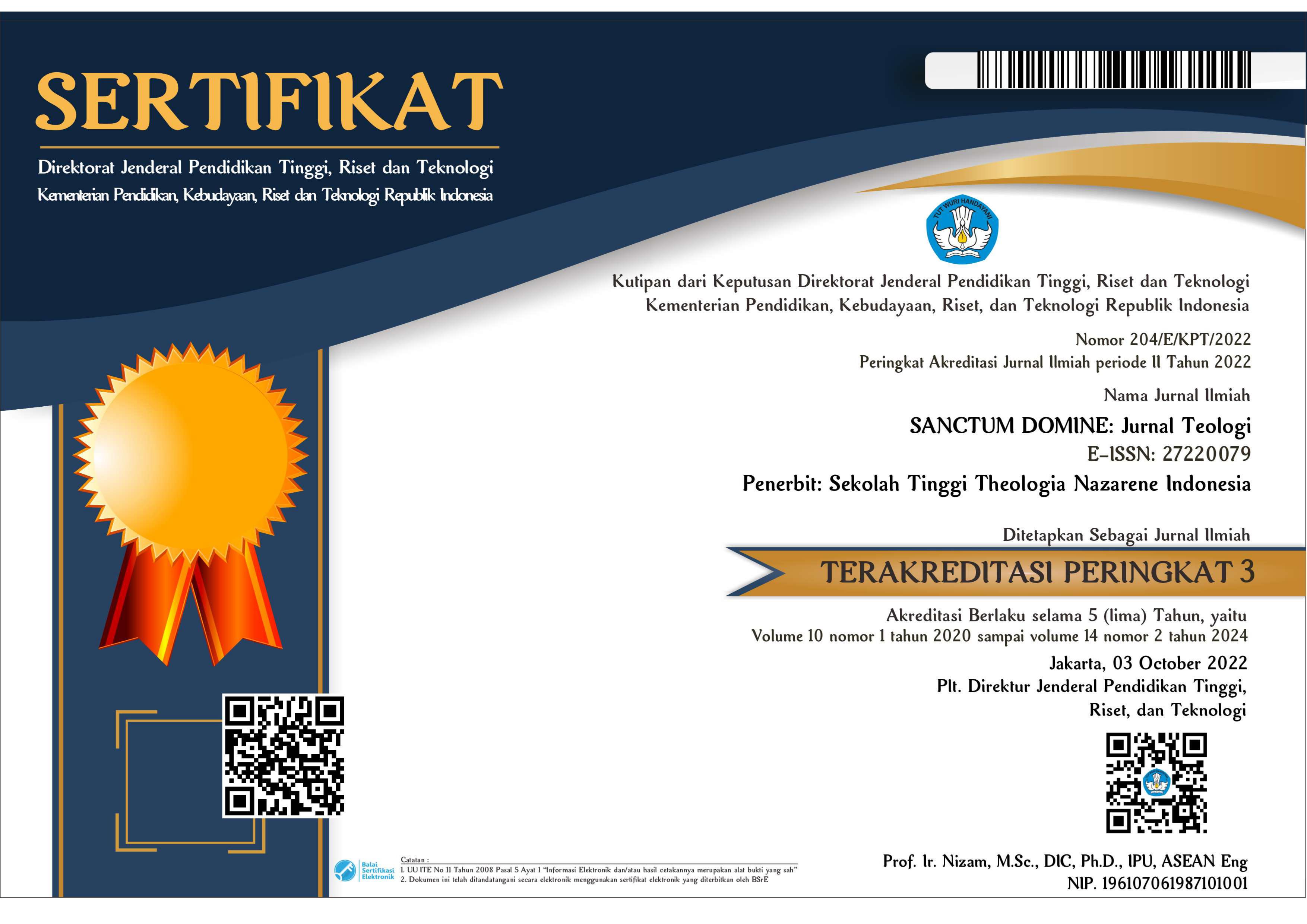Theology of Religions in the Lens of Pentecostal Hospitality
Abstract
The multi-religious reality in Indonesia is a necessity. Religion has the highest value in the social life of people in Indonesia. Therefore, religion is used as a source of inspiration that regulates the survival of interfaith life. However, differences in religion can be a source of problems if they are not able to be managed properly. Conflicts and violence on behalf of religious defenders are prevalent in Indonesian society. The Holy Spirit that dwells in Pentecostal believers should bring hospitality in society. Therefore, a systematic construction of the position and relationship of Pentecostal hospitality with the theology of religions is needed. The research method used is descriptive-intrepretative qualitative and the analysis uses comparative and argumentative approaches. The results show that Pentecostal Hospitality brings grace to society at large. The Holy Spirit is the one who enables Pentecostals to do comparative and pericoretic theology in relation to religions.
References
Abdillah, Aldi, Anggi Maringan Hasiholan, Ivonne Sandra Sumual, Allen Jordi Ibran, and Josua Steven. “Social Interaction in Petamburan as a Form of Socio-Religious Tolerance in Indonesia .” KnE Social Sciences 2022 (2022): 1–19.
Abdillah, Masykuri. “Membendung Politisasi Agama.” Kompas.Com.
Aritonang, Jan Sihar. Sejarah Perjumpaan Kristen dan Islam di Indonesia. Cet. IV. Jakarta: BPK Gunung Mulia, 2010.
D’Costa, Gavin. Christianity and World Religions: Disputed Questions in the Theology of Religions. Chichester: Wiley-Blackwell, 2009.
———. Theology and Religious Pluralism: The Challenge of Other Religions. Oxford: Basil Blackwell, 1986.
Evans, James H., Francis Schussler Fiorenza, and James C. Livingston. Modern Christian Thought, Second Edition: The Twentieth Century, Volume 2. Edited by Sarah Coakley. Minneapolis: Fortress Press, 2006.
Ginting, Edi S. “Theologia Religionum (Teologi Agama-Agama).” In Teologi-Teologi Kontemporer, edited by Jan Sihar Aritonang, 184–201. Jakarta: BPK Gunung Mulia, 2018.
Harmakaputra, Hans Abdiel. Melepas Bingkai: Upaya Pencarian Jalan-Jalan Lain Yang Mengatasi Kebuntuan Model Pendekatan Tipologi Tripolar Dalam Diskursus Teologi Agama-Agama Kontemporer. Jakarta: Grafika Kreasindo, 2014.
Hasiholan, Anggi Maringan, and Aldi Abdillah. “The Concept of Love in Islam, Christianity, and Judaism for the Postmodern Indonesian Religious Communities.” Dialog 45, no. 2 (2022): 195–206.
Hershberger, M. Hospitalitas Orang Asing: Teman Atau Ancaman? Jakarta: BPK Gunung Mulia, 2009.
Keener, Craig S. Spirit Hermeneutics: Reading Scripture in Light of Pentecost. Grand Rapids, Michigan: William B. Eerdmans Publishing Company, 2016.
Knitter, Paul F. Pengantar Teologi Agama-Agama. Edited by Nico A. Likumahuwa. Yogyakarta: Kanisius, 2008.
Krisna Pakpahan, Gernaida, Ibnu Salman, and Andreas Budi Setyobekti. “Internalisasi Nilai-Nilai Pancasila Dalam Upaya Mencegah Radikalisme.” KURIOS: Jurnal Teologi Dan Pendidikan Agama Kristen 7, no. 2 (2021).
Land, Steven Jack. Pentecostal Spirituality: A Passion for the Kingdom. New York: Sheffield Academic Press, 2010.
Moltmann, Jürgen. God in Creation: An Ecological Doctrine of Creation. London: SCM Press, 1985.
Noble, Joshua. “The Meaning of Ἔχοντες Χάριν Πρός in Acts 2.47: Resolving Some Recent Confusion.” New Testament Studies 16, no. 2 (2018).
Palmer, Parker. The Company of Strangers: Christians and the Renewal of America’s Public Life. New York: Crossroad, 1981.
Pratama, Natanael D B J. “Roh Kudus Dalam Agama-Agama Lain: Sebuah Analisis Terhadap Pemikiran Gavin D’Costa.” Jurnal Amanat Agung 9, no. 1 (2013): 67–100.
Race, Alan. Christians and Religious Pluralism: Patterns in the Christian Theology of Religions. London: SCM Press Ltd, 1983.
———. Making Sense of Religious Pluralism: Shaping Theology of Religions for Our Times. London: SPCK, 2013.
Rapar, Jan Hendrik. Filsafat Politik Plato, Aristoteles, Augustinus, Machiavelli. Jakarta: Raja Grafindo Persada, 2004.
Siahaya, Johannis, and Harls Evan R. Siahaan. “Menggagas Hospitalitas Pentakostal: Membaca Ulang Kisah Para Rasul 2:44-47 Di Masa Pandemi.” DUNAMIS: Jurnal Teologi dan Pendidikan Kristiani 5, no. 2 (2021): 426–439.
Simangunsong, Wasti Samaria, and Sabrina Asril. “Kronologi Penangkapan Terduga Teroris Di Bekasi, Sejumlah Buku Disita.” Kompas.Com, 2023. https://megapolitan.kompas.com/read/2023/10/29/08362031/kronologi-penangkapan-terduga-teroris-di-bekasi-sejumlah-buku-disita.
Sinaga, Martin L. “Pendahuluan: Theologia Religionum.” In Meretas Jalan Teologi Agama-Agama Di Indonesia: Theologia Religionum, edited by Tim Balitbang PGI, 1–14. Jakarta: BPK Gunung Mulia, 2003.
Soesilo, Yushak. “Pentakostalisme Dan Aksi Sosial: Analisis Struktural Kisah Para Rasul 2:41-47.” DUNAMIS: Jurnal Penelitian Teologi dan Pendidikan Kristiani 2, no. 2 (2018): 136–151. https://pgi.or.id/gereja-media-dan-era-digital/.%0A147.
Sudharto. “Multikulturalisme Dalam Pespektif Empat Pilar Kebangsaan.” Jurnal Ilmiah CIVIS (2012).
Sumartana, Th. “Theologia Religionum.” In Theologia Religionum: Meretas Jalan Teologi Agama-Agama Di Indonesia: Theologia Religionum, edited by Tim Balitbang PGI. Jakarta: BPK Gunung Mulia, 2007.
Tambunan, Anggi Maringan Hasiholan, and Andreas Budi Setyobekti. “Ekstraksi Pemahaman Cyprianus Tentang Extra Ecclesiam Nulla Salus Bagi Gereja Pentakosta Di Era Postmodern.” KHARISMATA: Jurnal Teologi Pantekosta 4, no. 1 (2021): 28–42.
Vondey, Wolfgang. “Religion as Play: Pentecostalism as a Theological Type.” Religions 9, no. 3 (2018): 1–16.
Yong, Amos. Hospitality and the Other: Pentecost, Christian Practices, and the Neighbor (Faith Meets Faith Series). New York: Orbis Books, 2008.
Zakiyah, Zakiyah. “Moderasi Beragama Masyarakat Menengah Muslim: Studi Terhadap Majlis Taklim Perempuan Di Yogyakarta.” Harmoni 18, no. 2 (2019): 28–50.
Copyright (c) 2023 SANCTUM DOMINE: JURNAL TEOLOGI

This work is licensed under a Creative Commons Attribution-NonCommercial-ShareAlike 4.0 International License.
Copyright:
SANCTUM DOMINE: Jurnal Teologi will validate, produce, disseminate, and act as steward in the long-term curation of every article published. In order to achieve this, the author typically requires a transfer or “assignment” of the copyright in the article. As is the case for open access publishing, the author (or copyright owner of the article, if different) signs an author publishing agreement. The agreement incorporates the necessary transfer of copyright.
After assigning copyright, the author will still retain the right to:
- Be credited as the author of the article.
- Own and exercise any trademark or patent rights held by author and addressed in the article.
- Make printed copies of the article to use for a lecture or class that the author leading on a non-commercial basis.
- Share the article with friends, colleagues and influential people the author would like to read the work.
- Present the article at a meeting or conference and distribute printed copies of the article on a non-commercial basis.
License:
This work is licensed under a Creative Commons Attribution-NonCommercial-ShareAlike 4.0 International License.
You are free to:
- Share — copy and redistribute the material in any medium or format
- Adapt — remix, transform, and build upon the material
- The licensor cannot revoke these freedoms as long as you follow the license terms.
Under the following terms:
- Attribution — You must give appropriate credit , provide a link to the license, and indicate if changes were made . You may do so in any reasonable manner, but not in any way that suggests the licensor endorses you or your use.
- NonCommercial — You may not use the material for commercial purposes .
- ShareAlike — If you remix, transform, or build upon the material, you must distribute your contributions under the same license as the original.
- No additional restrictions — You may not apply legal terms or technological measures that legally restrict others from doing anything the license permits.
Notices:
You do not have to comply with the license for elements of the material in the public domain or where your use is permitted by an applicable exception or limitation .
No warranties are given. The license may not give you all of the permissions necessary for your intended use. For example, other rights such as publicity, privacy, or moral rights may limit how you use the material.



8.png)









